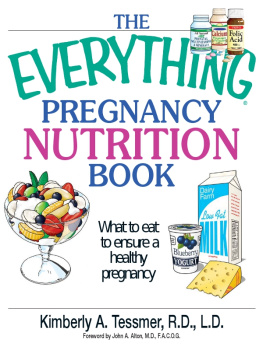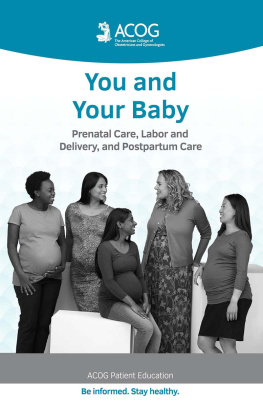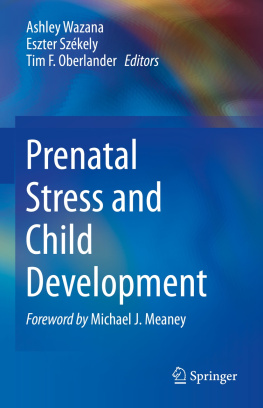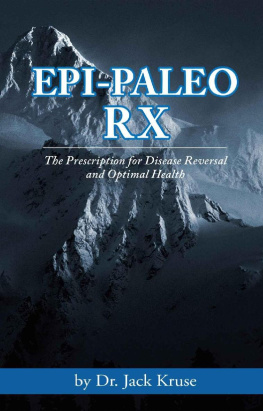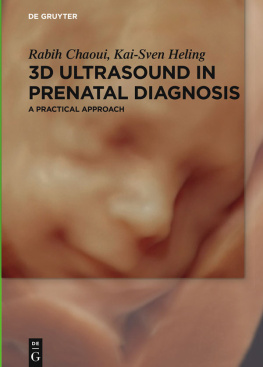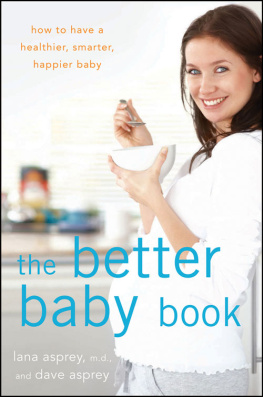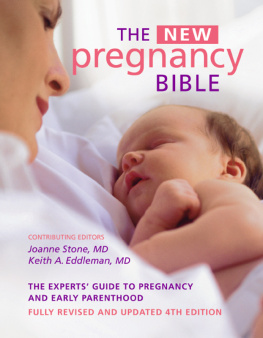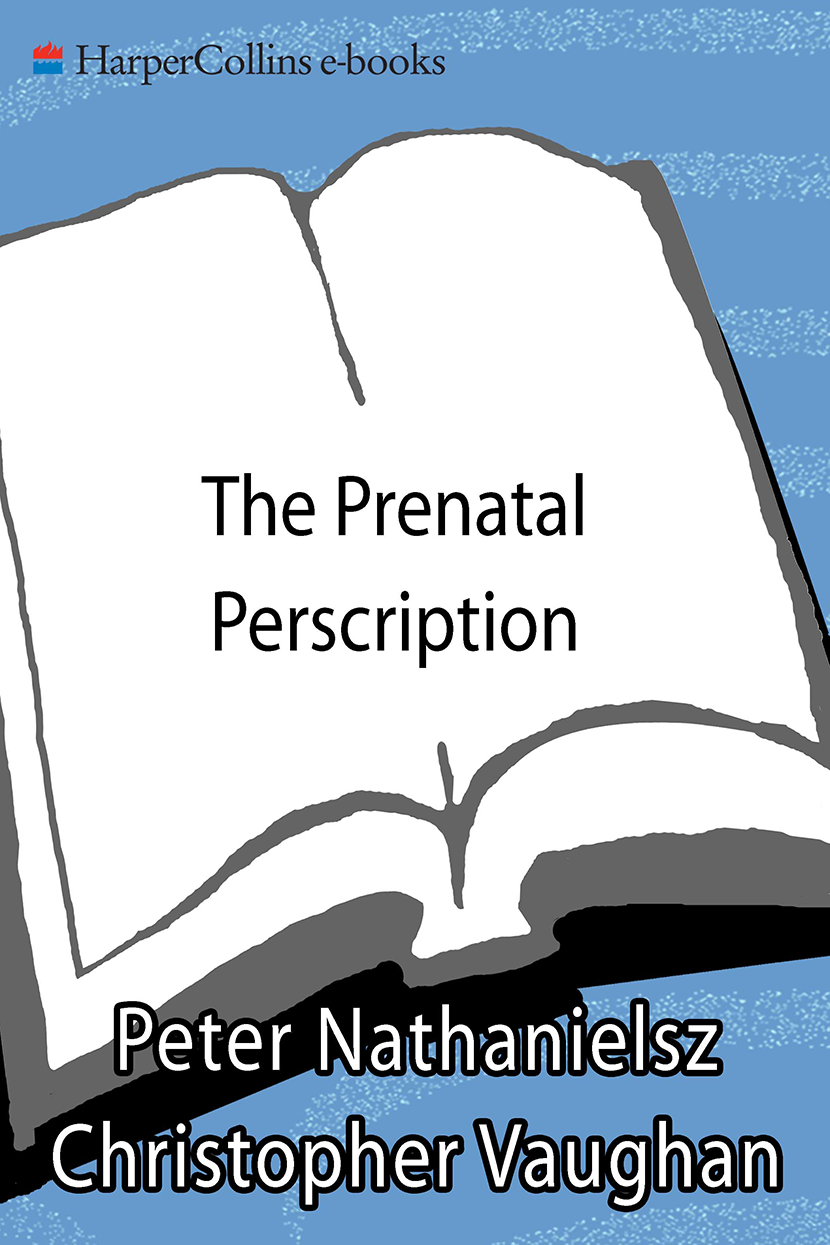AS PARENTS, THE GREATEST GIFT WE CAN GIFT. TO OUR CHIL dren is the gift of lifelong health, This promise is not as outlandish as it may first seem. Biomedical research over the past decades has conclusively determined that the physical, hormonal, and even emotional interaction between a mother and her child in the womb has a concrete effect on that childs physical and mental health for decades to come. This discoverythe single most important story to came from biomedical research since the determination of the structure of the geneis the subject of this book. Sometimes called fetal programming, or the fetal origins of adult disease, this research suggests that the long-term effects of the environment in the womb on the health we enjoy throughout life are even more important than our genes. They are certainly much more under our control.
The fetal programming story is one of optimism and hope, because there are things that we can do to ensure that tomorrows childrenincluding your own precious babyhave the best possible home before birth and therefore have the best chance of a healthy life. And for those of us who have already passed through the first important chapters of life, there is still a benefit in understanding this exciting new knowledge. Understanding the implications of fetal programming enable all of us to live a lifestyle that is more in tune with who we are, biologically.
For over thirty years I have been striving to understand the beautiful and intriguing mysteries of life in the womb. I have spent much of my time trying to delve into the intimate hormonal and chemical conversations that pass between a mother and her child during the nine months of gestation. From my early days at Cambridge University to my current position as director of the Laboratory for Pregnancy and Newborn Research at Cornell University, I have been promoting child and maternal well-being by investigating how we can best nurture our childrens health. At home, my wife and I have learned that much of what we do in rearing our children is done by trial and error. You may read the books and learn all you can about getting them to eat a healthy diet and behave properly, but when you are actually parenting a child, you often find yourself making it up as you go along. But at the same time, in my laboratory and through interaction with other researchers at scientific conferences around the world, I was learning that there is another type of parenting that we can start much earlier and that has long-lasting benefits. I was learning how we can parent children prenatally so that they develop in the healthiest possible way. Furthermore, in contrast to the catch-as-catch-can style of parenting required when actually raising these adorable but chaotic children, prenatal parenting can be done with a fairly simple and doable program.
What I want to do is show you how and why a program of prenatal parenting can work for you. First, I want us to look at how and why prenatal programming takes place, how nutrition, stress, exercise, toxins, tobacco, and other environmental influences can be factors for good or ill during your pregnancy. Second, I want to provide practical and easy tools that you can use in your own life to make your prenatal interactions with your baby memorable and as beneficial as possible.
How do we know that life before birth strongly influences our health for decades? The evidence is impressive and overwhelming, and comes from three very different sources, each of which reinforces the others: human epidemiological data, research with patients, and animal research. The first source of evidence grows out of massive human epidemiologic databases of medical records of babies born in the last century. Researchers have followed these people throughout their lives to see what sort of health they enjoyed, and how their lifetime health patterns correlated with their weight at birth and other indications of the quality of life they enjoyed in the womb. In doing this, these intrepid and hardworking researchers have amassed impressive, and compelling, reservoirs of modem medical data that reveal the nature of prenatal programming.
Next is the evidence that comes from animal studies conducted in many laboratories throughout the world. The crucial strength of the animal studies is that they are carefully controlled and can be repeated and confirmed independently by researchers with different biases. While some people might claim that research on rats is not the same as what happens in people, animals and humans use very similar underlying common mechanisms in the care and feeding of their young. In the case of the placenta, for instance, every placentawhether human, hyena, or hippomust transfer oxygen one way and carbon dioxide the other. We have a saying in veterinary research that there is one medicine, one system for understanding health and disease in all animals, including the human animal. Regardless of whether the information comes from a human, a horse, or a rat, the information Don always tells us something about how our common biological mechanisms work.
Finally, the concept of programming of lifetime health is further supported by clinical research on patients with a wide variety of diseases. By tracing back the origins of many diseases, physicians are more and more often finding that the origins of such diseases lie in fetal life. So the overwhelming evidence that the quality of life in the womb is critical to lifelong health comes from this triangle of evidence that cries out to us to pay attention.
Fetal programming, one of those few scientific ideas that comes along and completely alters conventional wisdom about the best ways to rear healthy, happy children, is truly a paradigm shift. Like many revolutionary ideas, it started out as a seeming fantasy because it was so at odds with what was scientifically known and accepted. After years of research and questioning, the idea has slowly become accepted among scientists.
The scientific interest in the issue of prenatal programming is now so intense that in the last year I have attended three meetings of the National Institutes of Health that have addressed the issue. The interest is so wide-ranging that one of the meetings was convened by no less than five of the important Institutes and Centers at the NIH. The National Institute of Child Health and Human Development, directed by Dr. Duane Alexander, has perhaps the most direct interest in fetal development, so it was not surprising that it should convene a workshop on the topic. The other cosponsors also had a clear interest in fetal programming. The National Heart, Lung, and Blood Institute has noted the important observation that low birth weight is associated with heart disease and stroke in later life. The National Institute of Diabetes and Digestive and Kidney Diseases was interested not only to learn more about the studies indicating a relationship between poor maternal nutrition during pregnancy and the likelihood that children will get diabetes in later life, but also how the increased likelihood of getting diabetes can be passed down intergenerationally from mother to daughter and granddaughter. The Office of Research on Womens Health, directed by Dr. Vivian Pinn, has taken a deep interest in the concept of fetal programming as well. From the biological point of view, the story of fetal programming shows clearly that for the health of our society, womens health is more important than mens. As we will see, many aspects of good health, not just a tendency to diabetes, are passed from mother to daughter. For men, the quality of life in the womb is important for their own health, but they do not pass it on down through following generations.


